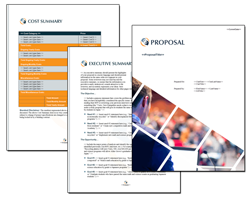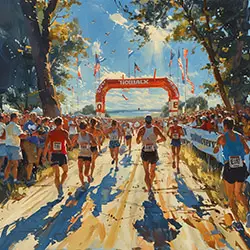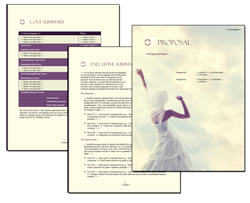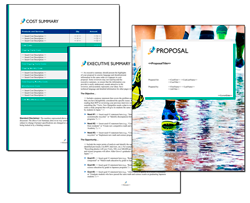
Event Success: How to Write an Event Planner Proposal That Wins
Drafting an event planning proposal that engages and persuades clients is manageable. In this guide, you'll learn how to write one using techniques such as understanding client needs, showcasing your expertise, and presenting a clear project vision. Get ready to create a winning proposal that speaks to your professionalism and dedication.
Key Takeaways
- An effective event planner proposal must begin by thoroughly understanding and establishing the client's needs, building trust, and tailoring the proposal to their vision and expectations.
- The proposal should be detailed and structured, incorporating engaging content, a clear event vision, a well-defined budget and timeline, and legal considerations and potential challenges.
- Using event proposal templates saves time and creates well-structured event planning pitches. These pre-built, customizable templates for various events, including weddings, corporate events, and sponsored events, are a time-saving tool that helps you create unique event visions and complete proposals faster. They contain the information stakeholders want before approving an event, including sections for event objectives and sponsorship.
- Personalization, showcasing past successes, and using technology to enhance your proposal presentation and design is critical for distinguishing your services and aligning with the client's unique objectives and brand.
Understanding Your Client's Needs

The initial step in drafting a winning event planner proposal is understanding your client's requirements. Identifying client expectations is crucial in understanding their desired outcomes and preferred communication channels, whether a wedding event or a corporate conference. This event planning process is all about building trust. How? By communicating and asking targeted questions that clarify expectations.
The initial client meeting is fundamental in getting a feel for the client's event vision and setting the groundwork for a successful proposal. You understand the client's vision, values, and expectations during this meeting. This ensures the event vision aligns with the client and demonstrates your understanding, which justifies the choices made in the proposal. This creates a sense of trust and confidence in your prospective client and shows that you have their best interests at heart.
Use Cases for Event Planning Proposals
Event planning proposals are multi-faceted. They serve as detailed roadmaps for event orchestration and convincing pitches for prospective sponsors or investors. They can be used for:
- Corporate Retreat and Team Building Event
- Wedding Planning and Coordination Services
- Annual Charity Gala Fundraising Event Management
- End-to-End Conference Management for Industry Professionals
- Social Gathering Planning
- Public Speaking Engagement Event Planning
- Sports Tournament Organization and Event Management
- Art Exhibition Setup and Promotional Event Planning
- Music Festival Production and Logistic Services
- Product Launch and Corporate Celebration
- Virtual Conference and Online Event Planning
- Cultural Festival Planning and Execution Services
- Political Campaign Events and Rally Coordination
- Educational Workshop and Training Seminar Event
- Year-End Corporate Awards Ceremony and Dinner
To stand out in a crowded event planning market, your proposal should offer an engaging experience rather than just presenting basic information. This can be achieved by incorporating interactive elements such as:
- Videos
- Animated timelines
- Charts
- Graphs
These elements will engage clients more effectively. Moreover, personalization, such as dynamic variables tailored to the recipient, can make your event proposal more appealing to potential clients.

The Proposal Kit software and templates allow you to sprinkle tags throughout your proposal template that will merge your client's information wherever you want it in the final proposal, making the proposal appear more explicitly tailored to that client.
So, whether you're writing a business proposal for a corporate event, a sponsorship proposal for a charity event, or a wedding planning proposal, remember to customize it according to the specific use case. Ultimately, the goal is to create a winning event proposal that secures sponsors or sells the prospective client on your vision.
Creating a Winning Event Vision
Your event vision forms the core of your proposal. It's where you communicate the event description, what the event is about, and how it aligns with the client's vision and target audience. This is where you showcase your creativity and offer engaging experiences to attendees. After all, an event is just as much about the attendees as the host.
To create an event vision, consider creative event concepts and themes that can offer engaging experiences to attendees.
These concepts demonstrate creativity and promise an engaging event experience. Making this part of your proposal compelling will resonate with your client and create exciting anticipation for the attendees when you have painted a picture of how their event will look and feel.
Detailed Event Planning Proposal Structure

Each component of your event proposal enhances the other, resulting in an enjoyable experience. Knowing how to write an event proposal is crucial, as it involves understanding the fundamentals and creating content that can secure clients and get them excited about the event. Its elements, from introduction to services and solutions to a comprehensive budget and timeline, should be carefully written and organized to communicate your event plan clearly and convincingly.
The Proposal Kit system will create your proposals in a structured format that flows from one section to the next in the correct order.
Introduction and Background
The introduction of your proposal should:
- Outline your background, qualifications, and unique skills that set you apart
- Set the tone for what follows
- Showcase your expertise to prospective clients
This introduction is crucial in showcasing your expertise to prospective clients.
It's like your mission statement, giving a brief overview of who you are and why you are the best fit for their event planning needs.
Services and Solutions

After the introduction, it's time to detail your services and solutions. The proper format for an event, whether hackathons, workshops, ideathons, or sporting events, is determined based on time, budget, resources, and objectives. Services and solutions should be carefully researched and detailed clearly within the proposal, ideally in bullet format or sectioned for more significant events. This shows the client that you have a clear understanding of their requirements and have the capabilities to meet them.
All essential elements must be covered, from logistics management to vendor selection. For instance, event management software can increase attendee engagement by offering personalized experiences and facilitating networking opportunities. Such details demonstrate your logistical management skills within the proposal and show your ability to execute the event efficiently.
Budget and Timeline
A transparent and detailed budget and a clearly defined timeline will build trust and set clear expectations with the client. The budget should include all costs, such as venue rental, catering, security, and marketing, reflecting the realistic financial scope of the project. Budget options show versatility and allow clients to choose based on their financial comfort and the event's desired impact.
A clearly outlined timeline in the proposal demonstrates your organizational skills and sets realistic expectations for event milestones. You create a realistic proposal by aligning the budget with the event vision and the client's needs.
Showcasing Past Successful Events
Highlighting past successes offers your potential client a glimpse of the possible success of their event. By outlining your experience and professionalism, you give clients a reason to trust and choose your service. This could be in the form of client testimonials, data from previous successful events, or even photos from past events.
Illustrating past events that resonate with the current project's vision and client's style instills confidence in your event planning skills. Whether it's a successful charity event you organized or a corporate event that exceeded client expectations, sharing these experiences adds a layer of trust and proof of expertise to your proposal.
Customizing Proposals for Each Client
Tailoring the proposal to the client's needs is the key to making it stand out. By customizing proposals to each client's needs, you demonstrate an understanding of their expectations and showcase a bespoke approach to event planning. This could involve addressing their needs, offering budget options, or emphasizing unique selling points.
For instance, providing clients with various financial options, such as an itemized budget with flexible and hard costs and presenting a high - and low-end budget, allows them to select services that best align with their finances. Also, personalizing the proposal, emphasizing unique selling points and potential benefits, helps it stand out from the competition and builds a stronger connection with the client's brand.
Using Technology

Technology is instrumental in simplifying event planning and boosting the quality of client proposals. Event planning software simplifies organization by consolidating logistics, registrations, and other details in one place. Incorporating modern event technology into proposals signals your competency and adaptability to event planning practices.
Addressing Potential Challenges and Risk Management
Every event brings its own set of challenges. Therefore, your proposal must demonstrate that you can handle potential challenges and have a solid risk management plan. It reassures the client of your ability to manage changes and maintain clear communication about the scope, budget, and timeline implications.
Some events may need professional security and medical staff on site.
Setting ground rules for participant behavior during the event encourages constructive dialogue and focuses on the collaborative pursuit of solutions, adding a layer of risk management. Some ground rules to consider include:
- Respect others' opinions and ideas
- Listen actively and avoid interrupting
- Use inclusive language and avoid offensive or discriminatory remarks
- Stay engaged and participate actively in discussions
Additionally, employing post-event evaluation tools like surveys, feedback forms, and performance analytics is crucial for reviewing successes and areas for improvement. This not only helps address challenges but also informs us of future events.
Legal and Contractual Aspects

Incorporating legal and contractual aspects of your services is vital. A written event contract defines the services' scope and is a legal reference in disputes. The contract should clearly outline the payment schedule, specifying due dates for initial deposits and payments associated with planning milestones.
Cancellation clauses must be incorporated to safeguard your compensation if the client cancels the event mid-preparation. Also, including a 'cancellation by planner' clause allows you to withdraw from the contract under certain conditions, with provisions for client recompense.
Moreover, indemnification clauses protect you from legal actions due to the client's negligence, including guest injuries or venue damages.
Consult with a local attorney to ensure your contracts are up-to-date and legally binding.
Enhancing Proposal Presentation and Design
Your proposal's aesthetic appeal and layout hold equal importance to its content. A well-structured proposal with coherent use of company logos, colors, and custom design elements communicates a lot about your capability and attention to detail. Incorporating visuals such as:
- Mood boards
- Pictures
- Videos
- Client testimonials
This provides a richer context, demonstrating expertise and enhancing the proposal's persuasion factor.
Personalizing the proposal with elements like a custom cover page, table of contents, and the client's branding details fosters a connection with the client and makes the proposal stand out. The impact of your proposal is also influenced by its format and delivery; using a narrative alongside detailed logistics within a well-formatted PDF can make the final presentation more professional.
Here are some related samples included in every downloadable Proposal Pack
The AI Writer generates a first draft of these templates - customized to your company, client, and project - in just minutes, giving you a head start on editing. Get any Proposal Pack or Proposal Kit Professional, and all of these samples, and the AI Writer are included.
Here are some related downloadable templates
The AI Writer generates a first draft of these templates - customized to your company, client, and project - in just minutes, giving you a head start on editing. Get any Proposal Pack or Proposal Kit Professional, and all of these templates and the AI Writer are included.
- Beauty Pageant Proposal
- Celebrity Appearance at Sponsored Event Proposal
- Corporate Event Planner Services Proposal
- Event Party Planner Services Proposal
- Event Reschedule Proposal
- Florist Proposal
- Healthcare Workshop and Conference Proposal
- Holiday and Special Occasion Decorations Proposal
- Job Fair Proposal
- Live Entertainment Proposal
- Live Music Services Proposal
- Motivational Speaker Proposal
- Music DJ Proposal
- Reunion Party Planner Proposal
- Speaking Engagement Proposal
- Tradeshow Event Proposal
- Birthday Coverage Proposal Template
- DJ Proposal Template
Wrapping it up
A winning event planner proposal should offer a thorough overview that conveys the event vision unambiguously, encompassing:
- Event objectives
- Budget
- Timeline
- Staffing
- Venue details
It should demonstrate an understanding of the client's brief, appear as a match to their needs, and show alignment with their event goals. Proposals must project authority and experience, reassuring the client of the planner's capability to anticipate challenges and deliver a successful event.
The event sponsorship proposal can also attract sponsors, vendors, and other partners by outlining the event's potential for visibility and engagement. Providing a realistic and detailed budget in the proposal helps prevent financial surprises and lets the client see the value offered. A well-drafted proposal includes a detailed timeline of critical tasks and milestones tailored to the event's complexity and stakeholders' involvement.
Addressing the target audience within the proposal shapes the strategy for choosing the venue, themes, technologies, and marketing tactics. Event proposals should include the following sections:
- Technology and onsite equipment: Describe the technology and equipment that will be used to enhance the attendee experience, especially for hybrid events.
- Theme and aesthetics: Vividly outline the visual elements and branding opportunities, showing a grasp of the event's desired atmosphere.
- Post-event services: Outline site cleanup, impact reporting, and feedback collection to differentiate planners as diligent and comprehensive.
These sections will help create a comprehensive event proposal for the proposed event, ensuring a well-structured plan. Using an event proposal template can further streamline this process.
 Proposal Kit Professional provides the most content, including legal contracts and a free design theme pack. Plus, advanced software features include custom branding and customizable quoting databases.
Proposal Kit Professional provides the most content, including legal contracts and a free design theme pack. Plus, advanced software features include custom branding and customizable quoting databases. Proposal Pack for Any Business covers this type of proposal and includes samples. There are also some commonly used specialty design themes available:
Proposal Pack for Any Business covers this type of proposal and includes samples. There are also some commonly used specialty design themes available:Photo Design Proposal Packs
 Proposal Pack Artsy #11
Proposal Pack Artsy #11 Proposal Pack Bubbles #3
Proposal Pack Bubbles #3 Proposal Pack Bubbles #4
Proposal Pack Bubbles #4 Proposal Pack Business #24
Proposal Pack Business #24 Proposal Pack Catering #1
Proposal Pack Catering #1 Proposal Pack Catering #2
Proposal Pack Catering #2 Proposal Pack Elegant #7
Proposal Pack Elegant #7 Proposal Pack Entertainment #8
Proposal Pack Entertainment #8 Proposal Pack Entertainment #9
Proposal Pack Entertainment #9 Proposal Pack Events #4
Proposal Pack Events #4 Proposal Pack Events #5
Proposal Pack Events #5 Proposal Pack Events #6
Proposal Pack Events #6 Proposal Pack Events #7
Proposal Pack Events #7 Proposal Pack Events #8
Proposal Pack Events #8 Proposal Pack Fashion #5
Proposal Pack Fashion #5 Proposal Pack People #5
Proposal Pack People #5 Proposal Pack Seasonal #3
Proposal Pack Seasonal #3 Proposal Pack Social Media #2
Proposal Pack Social Media #2 Proposal Pack Travel #4
Proposal Pack Travel #4 Proposal Pack Wedding #4
Proposal Pack Wedding #4 Proposal Pack Wedding #5
Proposal Pack Wedding #5
Line Art Design Proposal Packs
 Proposal Pack Entertainment #1
Proposal Pack Entertainment #1 Proposal Pack Entertainment #2
Proposal Pack Entertainment #2 Proposal Pack Entertainment #3
Proposal Pack Entertainment #3 Proposal Pack Entertainment #4
Proposal Pack Entertainment #4 Proposal Pack Entertainment #5
Proposal Pack Entertainment #5 Proposal Pack Entertainment #6
Proposal Pack Entertainment #6 Proposal Pack Entertainment #7
Proposal Pack Entertainment #7 Proposal Pack Events #1
Proposal Pack Events #1 Proposal Pack Events #2
Proposal Pack Events #2 Proposal Pack Events #3
Proposal Pack Events #3 Proposal Pack Food #1
Proposal Pack Food #1 Proposal Pack Seasonal #1
Proposal Pack Seasonal #1 Proposal Pack Seasonal #2
Proposal Pack Seasonal #2 Proposal Pack Wedding #1
Proposal Pack Wedding #1 Proposal Pack Wedding #2
Proposal Pack Wedding #2 Proposal Pack Wedding #3
Proposal Pack Wedding #3
Summary
Writing an event planner proposal is an art that requires a deep understanding of client needs, creativity, and attention to detail. It's about showcasing your skills and expertise and demonstrating your knowledge of the client's vision, setting realistic expectations, and delivering a proposal that stands out from the crowd.
A well-written proposal is more than just a document; it's a communication tool that can make or break a business deal. It's your stepping stone to making a lasting impression on your clients and creating memorable events. So, keep these insights in mind, and you'll be on your way to mastering writing an event planner proposal.
Frequently Asked Questions
What are Proposal Packs designed for?
Proposal Packs are designed to help you write event planner proposals with pre-written templates, samples, graphic design options, and automation software, ensuring efficiency and professionalism in your proposal writing.
What is the structure of most event planning proposals?
Event planning proposals typically include introductions, a summary of the client's needs, service descriptions and costs, and information about the service provider and their credentials and capabilities. This structure allows for a clear and comprehensive overview of the event plan.
What should be included in a tailored proposal for a client?
A tailored proposal for a client should include a cover letter, title page, comprehensive understanding of the client's needs, services offered, benefits, cost summary, and other event-specific details. This ensures clarity and relevance for the client.
What should be included in the final information sections of a proposal?
In the final information sections of a proposal, it is essential to include company details such as About Us/Company History, Capabilities, Our Clients, Testimonials, or References pages. These sections provide valuable insight into the company and its track record.
How should a proposal be delivered to a potential client?
You can deliver a proposal to a potential client by saving it as a PDF or printing it on paper, based on your business and the client relationship. Ultimately, the method of delivery should align with the client's preferences.



 Cart
Cart
 Are you just looking for a template, sample, or software for your event proposals? Click these links to skip down the page and get right to it.
Are you just looking for a template, sample, or software for your event proposals? Click these links to skip down the page and get right to it.

 Facebook
Facebook YouTube
YouTube Bluesky
Bluesky Search Site
Search Site